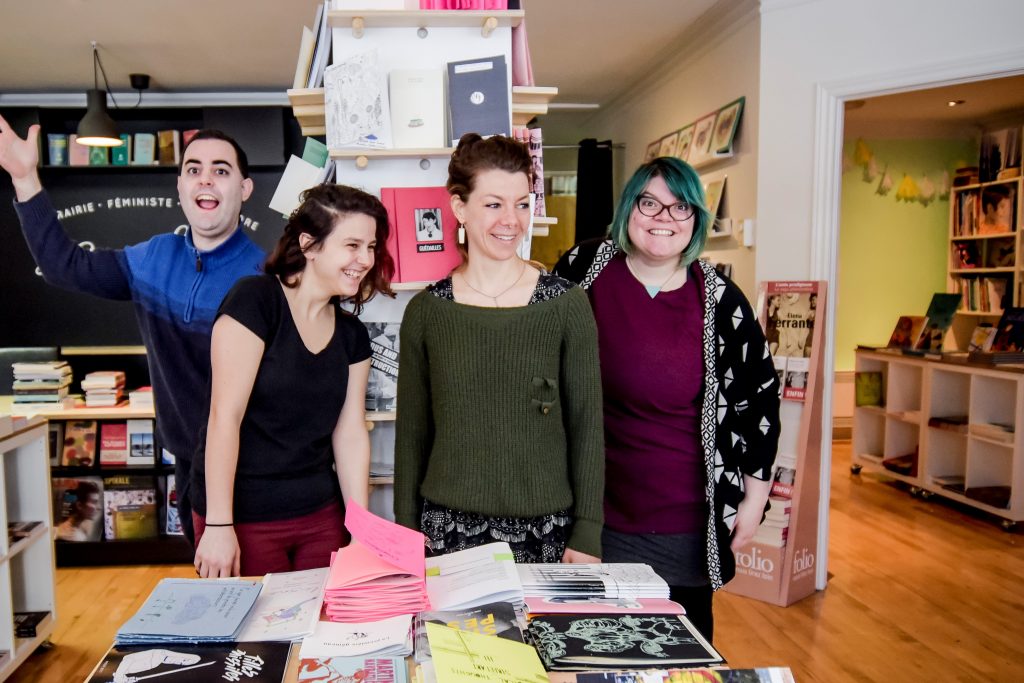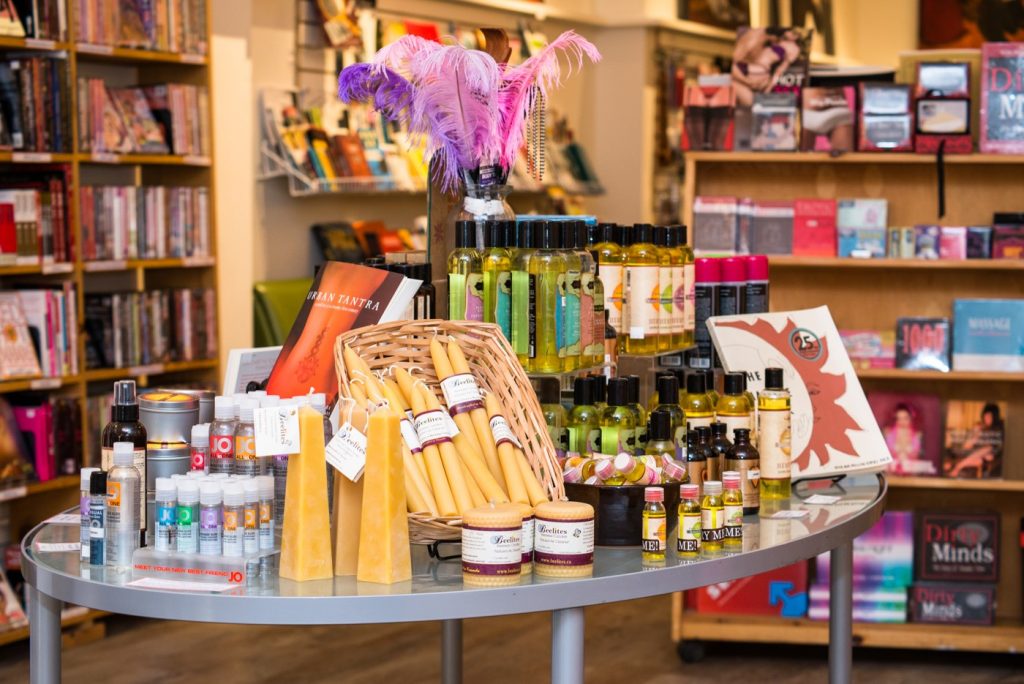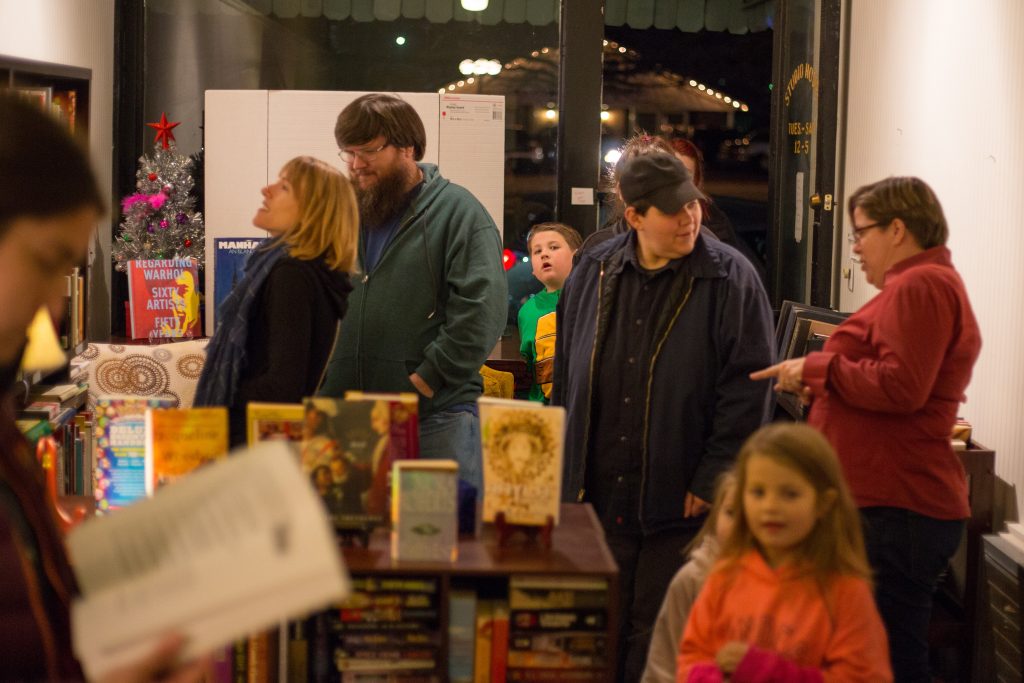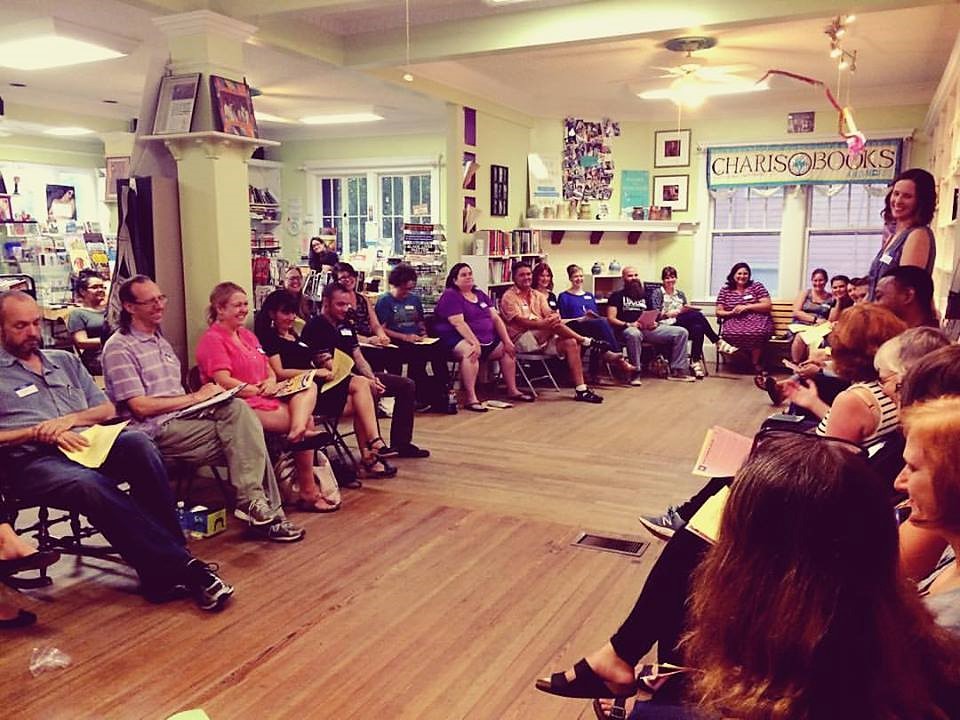
In the summer of 2015, Montreal bookseller Marie-Ève Blais noticed that Virginia Woolf’s essay A Room of One’s Own, which argues that female writers need an independent income, had been consigned to the fiction section of the bookstore where she worked. In a Facebook post, Blais decried the miscategorizing and misunderstanding of women’s literature and suggested that it was time a feminist bookstore opened in Montreal.
The idea had been circulating amongst local feminist and literary groups for a while. Literature student and feminist organizer Nicolas ( · ) Longtin-Martel had been chronicling the history of feminist bookstores in the city, while Stéphanie Dufresne, who had worked in publishing for years, had dreamt of opening a feminist publishing and printing collective that would amplify voices shut out of mainstream publishing.
Galvanized by on and offline discussions, a six-member collective was formed in mid-fall that included Blais, Longtin-Martel, and Dufresne. The collective, which had experience in feminist organizing and academia, launched a crowdfunding campaign in March 2016 and sent out a press release to local media. Much to their surprise, journalists jumped on the story, heralding the opening of Quebec’s only feminist bookstore. In just eight weeks, the campaign raised $32,500, outstripping their goal of $25,000 by 128 per cent.
L’Euguélionne, named for the alien heroine of a 1970s Quebec feminist sci-fi novel, opened in December 2016. Tucked down a side street in the Gay Village, the store stocks more than 5,000 French- and English-language books and zines, both new and used.
Some two thousand miles away in the small Mississippi town of Water Valley, University of Mississippi English professor Jaime Harker had been keeping an eye on the opening in Montreal. “I thought it was the coolest thing!” she said.
Harker, too, had been toying with the idea of opening a queer feminist bookstore inspired by the ’70s and ’80s feminist bookstores that she had been researching for a yet-to-be-published book on lesbian feminism and print culture in the American south. As a graduate student in Philadelphia, she was a regular at LGBTQ+ bookstore Giovanni’s Room, which was shuttered in 2014. She was alarmed by the dearth of queer and feminist bookstores in the country. “A lot of my students have never, ever been in any kind of feminist or queer bookstore,” she says. “They didn’t know it was possible.”
In October 2017, Harker launched her own crowdfunding campaign. In just four days, it had surpassed her modest goal of US$5,000, generating just over US$8,000. By December of that year, she had opened Violet Valley Books in a slender storefront of an old barbershop on Water Valley’s picturesque Main Street. It is the only queer and feminist bookstore in the state.
Clearly, a resurgence of sorts is in the air. Feminist bookstores have a rich history dating back to the 1970s. At one point, as many as 130 operated across Canada and the United States. For the next two decades, they pioneered new collective, cooperative business models and served as incubators for feminist and queer politics, theory, and ideas. The women at the helm supported burgeoning feminist periodicals and presses and innovated ways of categorizing and organizing feminist thought and books. The bookstores also nurtured connection and became community gathering places.
But by the mid-1990s, feminist booksellers, along with other indie and specialty stores, came under siege from big-box booksellers and online giants such as Amazon. Fighting for survival, many professionalized away from their collective, cooperative roots. The majority closed.
Now feminist bookstores appear to be making a comeback. Violet Valley Books and L’Euguélionne are the first feminist bookstores to open in North America in 15 years. Athenian is another crowdfunded bookstore soon to be open in Wilmington, North Carolina.
Two other long-established feminist bookstores have developed new business models to keep their doors open. Charis Books and More, which launched in Atlanta in 1974 and is now one of the longest operating feminist bookstores in the world, will relocate to the Decatur campus of historic women’s college Agnes Scott this spring, adding school merchandise to its stock. Venus Envy, which opened in Halifax in 1998 and Ottawa in 2001, serves its feminist and LGBTQ+ clientele by offering books alongside an education-orientated sex shop.
It Takes More than Books to Make a Feminist Bookstore
To survive in a new online world, this most recent incarnation of feminist bookstores is developing both new – and old – ways of building a loyal customer base.
On a quiet weekday afternoon in Montreal’s L’Euguélionne bookstore, a dozen women from the Centre d’éducation et d’action des femmes (CEAF), a community organization that has fought for women’s economic and social empowerment for nearly 50 years, meet for a workshop hosted by the bookstore staff. When a staff member lists the different sections of the bookstore’s collection, a lively discussion ensues about what it means to be queer, non-binary, and gender fluid – new terms for some of the older women, many of whom were active in the city’s feminist movement in the 1970s and 1980s. Staff pass around relevant zines and books. As the event wraps up, many women purchase books from L’Euguélionne’s used selection (priced at an accessible $5 and under for this event) while others ask for books to be set aside until they can return after their next pay day.
Another event aimed to break traditional approaches to the taboo topic of eating disorders. The bookstore invited authors who had written stories about experiencing eating disorders to talk at a roundtable. By inviting those with first-hand experiences to speak, the discussion avoided narratives that victimized. Moreover, other attendees felt safer sharing their own stories in an explicitly feminist environment. “When you come here, you aren’t judged, you are accepted,” says Dufresne. “By making our values explicit and out there, it encourages people to be mindful.”
To build and retain its customer base, Venus Envy in Ottawa also hosts regular workshops and community events. In one month, events included a workshop on how to talk to kids about porn and a book launch for a new series about trans teenagers by Montreal author and cartoonist Sophie Labelle. The store’s highly trained staff are constantly interacting with customers, offering advice on topics such as healing from sexual assault to mismatched sex drives or anything that might be asked of them. Venus Envy’s shop owner, Sam Whittle, says offering such support is part of the store’s core values. “Financially we don’t gain anything from talking to someone for 45 minutes when they aren’t going to buy anything, but we do it every time,” she says.

Whittle worked at the store for five years prior to becoming the owner, and her time on the store floor – in particular, the in-depth questions she’d field about sex, trauma, and healing – inspired her to pursue a master’s degree in social work. Just as she was finishing her degree, the owner was looking to sell. “It seemed like the perfect opportunity for me,” she says. “I love that we can have conversations with people in the store who will still come here but might never go see a therapist, and that I can also expand on the support and education side of things, the workshops, groups, and other more structured endeavours.” She now manages a staff of seven.
Charis Books and More also hosts events through a non-profit programming arm called Charis Circle, which organizes events like book launches, a race-conscious parenting group, and a trans youth group. Events have a suggested donation, most often in the range of US$5 to $20, but no one is turned away. Co-owner Sara Luce Look, who has worked at the store since 1994, says these gatherings are not just about bookselling but community building. “We are a public, feminist space open seven days a week; you can come in to browse, hang out, have a cup of tea, attend programs, get information,” she says.
Violet Valley has also made providing a space for community part of its mission. According to owner Jaime Harker, that became especially important when what’s been called the “the most anti-LGBT law in America” came into effect in Mississippi last October. HB 1523 allows public officials and businesses to deny services to LGBTQ+ people based on their personal religious beliefs. Support and donations for her store flowed in as people welcomed a “space where you can go and discover things and just feel accepted.”
Feminist Booksellers Operate a Little Differently
To run L’Euguélionne, the founding members established a non-profit solidarity cooperative, which means there is no private ownership; rather, the store is owned by a three-tiered membership base. The six co-founders, who also staff the store, are “worker members” while some 2,300 customers who pay a one-time $10 fee to support the store are “user members.” Individuals, organizations, and university departments can become “supporter members” by paying up to $200. Currently, these include Université du Québec à Montréal’s Institute of Feminist Research and Studies and the Quebec Lesbian Network. All members are entitled to one vote and a voice at the annual general meeting where decisions are made about the year ahead. Last fall, about 50 members attended.
The worker members chose a non-hierarchical, not-for-profit, multi-stakeholder cooperative model as the team wanted the business to outlive their own involvement. Moreover, the structure reduces “the power relations that exist within the organization and especially in the bookstore as a workplace,” says Dufresne.
But having six worker members managing the bookstore makes L’Euguélionne’s weekly operations meetings a little more time-consuming. These take place for half a day every Monday when the store is closed. The six make decisions as a collective, always aiming to reach a consensus on topics such as staff rotations, what books to stock, and how to respond to new partnership requests. As well, they pay attention to how they are operating as a team. Who is taking up space in discussions? Who is taking the lead in various areas? Each meeting has a “check-in” and “check-out” phase where the collective comments on the dynamics of the meeting itself, how they handled agenda items, and whether people felt there was tension. For sensitive and potentially divisive topics, the collective elects a “mood watcher” who monitors the atmosphere and intervenes to name dynamics she observes.
Six-way decision-making is demanding and takes extra time, diplomacy, and energy. But Dufresne says it builds and solidifies trust — in each other and their project. Co-founder Karine Rosso agrees, adding that the non-hierarchical business structure also enriches the bookstore’s stock and events programming. “We are six women who have different networks, who have different visions of feminism,” she says, adding that it’s also a welcome reprieve from the vertical structure of academia that she navigates as a PhD candidate and lecturer at the University of Sherbrooke.
A major challenge the collective constantly grapples with is making the bookstore economically sustainable. In addition to raising money from their crowdfunding campaign and member fees, L’Euguélionne received a $10,000 grant from PME Montreal, a government-backed organization that supports private sector and social economy startup ventures. This grant made them eligible for a $30,000 loan from Réseau d’investissement social du Québec (RISQ). La Caisse d’économie solidaire Desjardins, which partners with RISQ, gave them an extra $3,300 to complement the loan.
Still, the bookstore can’t afford to pay all six founding members a living wage. “We can’t support everyone full-time,” says Dufresne. “So we switch it up.” Who will get full-time hours is also discussed at weekly staff meetings.
Dufresne is hopeful that the bookstore can offer full-time employment to all worker members in the near future. “It’s important that our cooperative is run by people who can fully invest because they don’t have to have another job,” she says. When they can hire extra staff, they will prioritize women, LGBTQ+, and racialized folk as they already do so with contractors. (Venus Envy also prioritizes queer, trans, and people of colour in its hiring practices.)
Dufrensne says that surviving on book sales alone would be “ideal” but in the short term, the collective will actively look into government subsidies for social enterprises to improve pay conditions and expand their community outreach and events programming.
Violet Valley registered as a 501c3 non-profit, which means all donations the store receives are tax deductible. More than 90 per cent of the bookstore’s 2,000-strong collection is donated, both by publishers and individuals who send an eclectic range from lesbian mysteries to hardback literary fiction to history.

Just one month into operations, book sales covered expenses, which include rent, internet, a security system, electricity, and insurance. Harker says about $3,000 in Kickstarter money will go to buying books over the next six months while she keeps the remaining crowdfunding money “sitting in a savings account as a six-month emergency fund.” This February, Harker hopes to hire a paid bookseller one day a week but currently the store is not generating enough income to pay staff.
It is open only on Fridays and Saturdays to accommodate Harker’s work schedule as she depends on her full-time salary at the University of Mississippi. Volunteers also pitch in to help staff the store.
Venus Envy follows a more typical business model as a for-profit venture owned by Whittle. While the sex toys bankroll the business, Whittle says the book side is crucial, “because knowledge is key to having a great and healthy sex life.” The store stocks a wide range — erotica, books about sex, feminist fiction, and queer, feminist, and anti-racist theory — or as Whittle describes it, “things that are conscious of the way that sex and women are represented in the mainstream – things that flip power structures.”
Venus Envy also developed a charitable offshoot, creating a Bursary Fund to support women and trans people working towards a degree, diploma, or certificate in any subject; they also have a Pay It Forward program that raises money to give out binders and gaffs (shapewear for trans people) in store for free. Pay It Forward is funded entirely by community donations, both online and in store. The Bursary Fund is funded by community donations, although the store pays for fundraising events.
Charis Books and More is also a for-profit business, but shares the cost of rent and utilities with its non-profit programming arm, Charis Circle, 90 per cent of which is individually donor funded. “We intentionally seek funding only from sources who explicitly value the work we do and who don’t want to shape our programming to their missions,” says E.R Anderson, Charis Circle’s executive director. The other 10 per cent comes from family foundations located in the south who support free thought and feminist, queer, and anti-racist spaces.

Still, even with Charis Circle’s connections, the bookstore has been struggling to remain viable, which necessitated the move onto the campus of Agnes Scott where the bookstore will benefit from foot traffic and additional sales of school merchandise. It’s a way “to stay alive as a feminist bookstore in this generation,” says Look, who is the only full-timer amongst a staff of six. “We have been in survivor mode for so long.” Still, she says while wages are low, staff turnover is rare. “People who work here, work here for a very long time, or leave and come back.”
Harker is hopeful that the resurgence of feminist bookstores will not end here. As she believes the “outpouring of love” for her initiative has demonstrated, in the current political climate “people are looking for ways to build communities of support” — like feminist bookstores. Moreover, she believes the recent upsurge of interest in feminism is also likely to fuel interest for curated feminist spaces. “For a long time, it was easier for me to teach classes on LGBTQ+ literature than feminist literature, students resisted it. But that’s changed now,” she says.
Over in Atlanta, Look says business has been up since Trump’s election and the women’s marches in early 2016. “People are finding us again,” she says. “They are hungry to be in a place that they can see their lives reflected, and does programming, and is about change.”
Harker has encouraged all those who have asked for work in her store to start their own initiative, and hopes that the very existence of Violet Valley will inspire others, just as she was moved by the Montrealers. “Let’s make this a kind of larger network of support where people in little towns have spaces where they never could imagine, where they can suddenly see a future for themselves.”
Recommended Reads from Feminist Bookstores
Recommended by Stéphanie Dufresne of L’Euguélionne:
The Feminist Bookstore Movement: Lesbian Antiracism and Feminist Accountability by Kristen Hogan
Kristen Hogan worked at the Toronto Women’s Bookstore. In this book, she documents the whole history of the feminist bookstore movement. It’s absolutely fascinating and it talks at length about the different models that were created for feminist bookstores over time. It was extremely helpful for us while setting up L’Euguélionne.
Recommended by Sara Luce Look & E.R Anderson of Charis Books and More:
Your Money or Your Life: 9 Steps to Transforming Your Relationship with Money and Achieving Financial Independence by Vicki Robin and Joseph Dominguez
This is, in many ways, the Bible of reluctant capitalists, beleaguered booksellers, and mission-driven enterprises. The authors help you define your work and your relationship to money in terms of your life — literally your time in hours on this earth. When you consider your economic decisions through the lens of your life’s trajectory, it is easier to understand how to include meaningful work and not simply define yourself by how much you make or by others’ notions of a successful career. As feminist booksellers with a radical social justice mission, it’s helpful to remember that there are many ways to be rich and one of them is doing the work you believe you were put on this earth to do.
Bonus Recommendation: Emergent Strategy: Shaping Change, Changing Worlds by adrienne maree brown
Recommended by Jaime Harker of Violet Valley:
Girl Meets Boy by Ali Smith
The novel combines complex, delightful adolescent girls as narrators, interesting formal experimentation that is accessible, and a feminist take on Ovid’s Metamorphoses. Smith is exploring genderqueer identities without the jargon, and she brings generosity, playfulness, and wisdom to everything she writes. I am smitten by her; not only is she a great lesbian novelist, but she is the most interesting person writing in English today, period.
For me, feminism is about envisioning utopian spaces – spaces of freedom, creativity, and safety – that activists then try to translate in the real world. Art is central to women’s liberation, because it liberates your mind, first, and lets you believe in a better and more feminist world. Writers like Ali Smith remind us of the pleasures of language, the importance of empathy, and the continuities of the past in our present and future, and I think keeping that vision alive sustains us as we do the often unglamorous work of fundraising, organizing, and working out the details.
Recommended by Sam Whittle of Venus Envy:
Daring Greatly by Brené Brown
I know personally, I have a tendency to be overly concerned about what other people think, and I think that’s true for many women who are entrepreneurs. I love this book because it gives you the tools to hear and honour legitimate feedback about your business’ impact, while letting the petty criticisms just slide off your back. It’s helped me to take more risks and be okay with making mistakes, and I think those things are crucial to running a successful business.

Subscribe Now! (We are also on Patreon)




